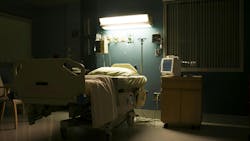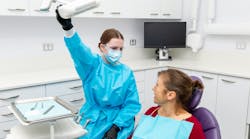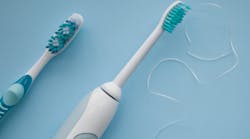Dear Patient: Brushing your teeth could save your life
Recently, a friend of mine’s teenage daughter was hospitalized with a severe illness. She posted updates daily on social media, and everyone sent well wishes and prayers. As her daughter entered the ICU, things got really scary. And instead of sending her more love, I launched into advice about brushing her daughter’s teeth.
You might think it's silly to worry about clean teeth when someone’s life is at stake. However, a recent study shows an association between toothbrushing and a decrease in hospital-acquired pneumonia (HAP).1 Brushing her teeth could literally save her life!
The data
According to the study, HAP is the most common and deadly health care associated infection (HAI), and yet there is minimal data on how to prevent it. This study examined whether "daily toothbrushing among hospitalized patients [was] associated with prevention of hospital-acquired pneumonia and improved objective outcomes."1
The study found that HAP rates were lower among patients who received daily toothbrushing, particularly those on ventilators. Remarkably, it was also associated with a shorter ventilator duration and a shorter ICU stay. (Note, though, that you don't need to be on a ventilator to contract this illness.)
This clearly highlights that the health of your mouth is directly connected to your overall health and your ability to fight or contribute to infection.
Have the right stuff
In my experience, the toothbrush and paste available at the hospital are not ones I’d ever recommend or use at home. The toothbrush head is usually huge, making it difficult to maneuver around the mouth, and the bristles are hard and can damage the gum tissue. This study shows that something is better than nothing, but would there be even better results with a higher-quality brush?
If you have ever tried brushing someone else's teeth, you know it can be difficult. Add to that the stress of having a loved one in the hospital on a ventilator, and it's even more of a challenge. If at all possible, ask one of your well-wishers to bring you a toothbrush with a compact head and very soft bristles. Even a baby toothbrush might be a good idea. It will be easier to maneuver around the mouth to disrupt the potentially deadly bugs hanging out there.
Toothpaste with fluoride is ideal for fighting decay, especially while mouth-breathing. Look for one that is nonfoaming. The bubbles can be difficult for someone who is intubated or has trouble swallowing.
If using a mouthrinse, ensure that it's alcohol-free. Alcohol-containing mouthwashes can dry tissues and kill both the good and bad bacteria in the mouth, and we'd like to keep all the good stuff we can! Apply it with a clean washcloth or sponge. A moisturizing mouth gel with a neutral pH and high xylitol concentration can help increase saliva production and inhibit the growth of harmful bacteria. But be sure to check with your medical team.
Get your mouth healthy
The CDC recently issued the Oral Health in Healthcare Settings to Prevent Pneumonia Toolkit to help hospital staff understand and implement proper oral health care for hospitalized patients and reduce HAP. It provides step-by-step instructions for caring for the oral health of both ventilated and nonventilated patients. However, it also reveals that routine preventive care visits at your dentist can reduce your risk of acquiring HAP by 22%. In summary, it pays to take care of your teeth, and if you do go to the hospital, don't forget your toothbrush!
Reference
- Ehrenzeller S, Klompas M. Association between daily toothbrushing and hospital-acquired pneumonia: a systematic review and meta-analysis. JAMA Intern Med. 2024;184(2):131–142. doi:10.1001/jamainternmed.2023.6638
About the Author

Amanda Hill, BSDH, RDH, CDIPC
Amanda Hill, BSDH, RDH, CDIPC, is an enthusiastic speaker, innovative consultant, and award-winning author who brings over 25 years of clinical dental hygiene and education to dentistry. Recipient of OSAP’s Emerging Infection Control Leader award and an active participant with the advisory board for RDH magazine, DentistryIQ, and OSAP’s Infection Control in Practice Editorial Review Board and membership committee, Amanda (also known as the Waterline Warrior) strives to make topics in dentistry accurate, accessible, and fun. She can be reached at [email protected].


